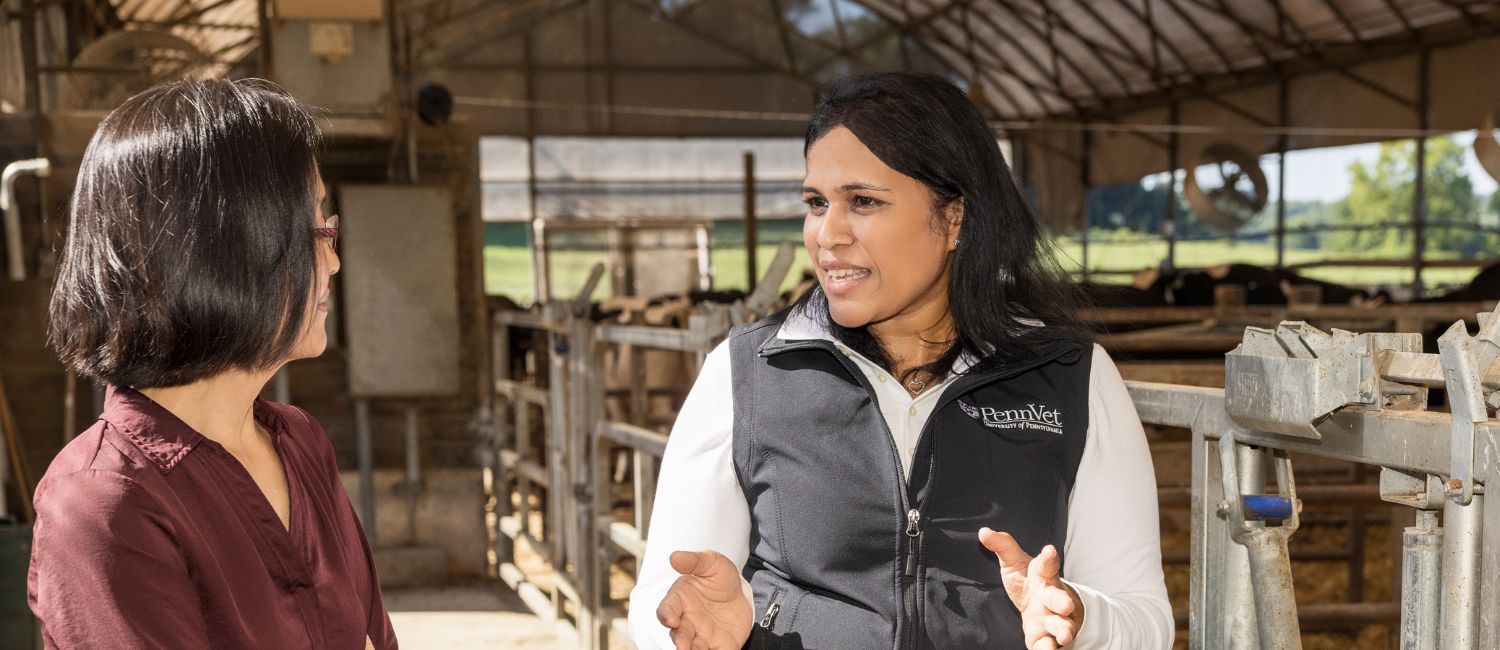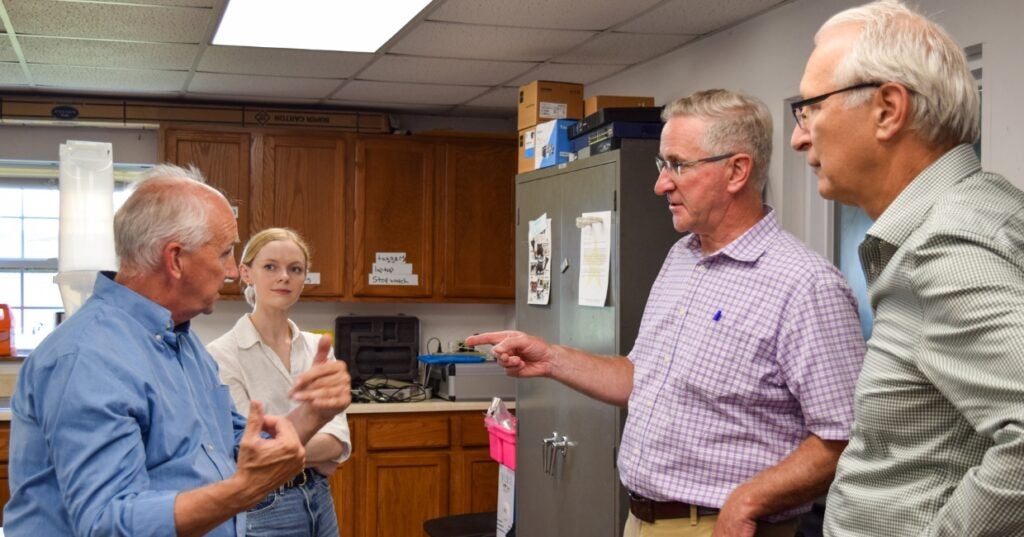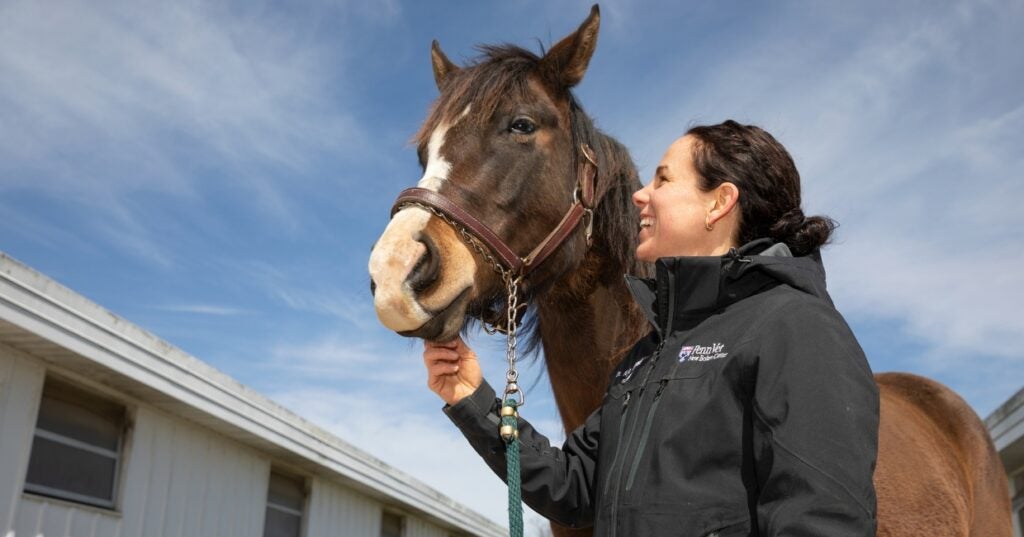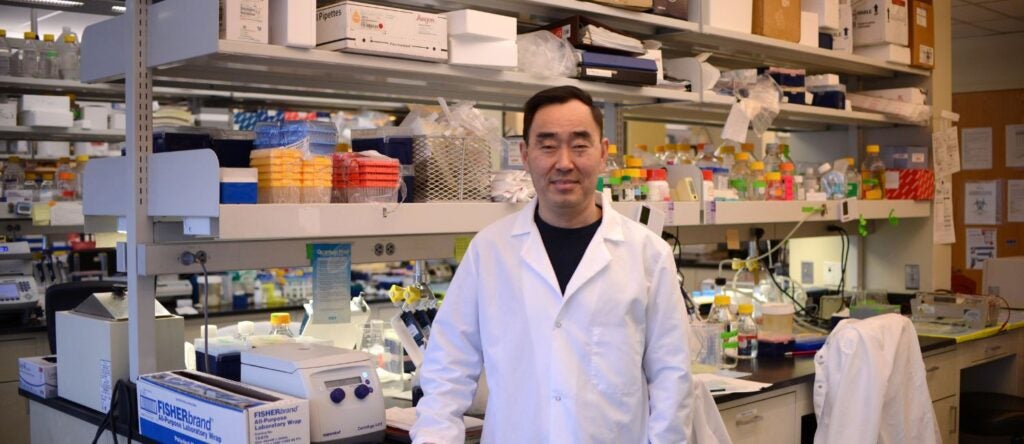Penn Vet Scientist Receives More Than Half a Million Dollars For Research and Development of Mitigation Technology to Halt Methane Emissions from Dairy Cattle

Funding from Gerstner Philanthropies will study effects of probiotic supplement to prevent methane production in commercial herds
The Mark Whittier and Lila Griswold Allam Associate Professor of Ruminant Nutrition, Dipti Pitta, PhD, at the University of Pennsylvania’s School of Veterinary Medicine (Penn Vet) has received a $508,884 grant from Gerstner Philanthropies to support Pitta’s continuing work to imprint the rumen function and prevent methanogen colonization in dairy calves with the potential of permanently curbing methane emissions from dairy herds in the United States. This study represents a vital step towards developing novel microbial interventions to not only curb methane emissions, but also to improve the performance of the American dairy system and the sustainability of animal agriculture.
“Methane is a contributor to rising land temperatures across the world, and it’s important that we pursue methods that can significantly reduce methane emissions,” said Pitta. “Developing innovative mitigation strategies to reduce enteric methane formation, while working at the interface of microbiology, agriculture, and dairy nutrition, is the primary area of my research.”
This newly funded study builds upon Pitta’s prior work. Along with her team of investigators, Pitta will be validating a special probiotic ‘cocktail’ on commercial herds. According to Pitta’s earlier pilot study in calves, the mixture, cultivated from natural gut bacteria, contributed to significant health benefits and a reduction in methane production in these calves. Over the course of eight weeks, dosed calves gained approximately 20 pounds more body weight than their control counterparts. They experienced lower stress levels, reduced inflammatory responses, and exhibited minimal methanogen populations. The goal of this latest phase of research is to validate the persistency of methane mitigation later in life and scale-up probiotic supplementation for commercial use on livestock farms to permanently curb enteric methane emissions.
The grant was awarded through Gerstner Philanthropies’ environment program, which fosters the translation of academic innovations for practical implementation to address climate change. It funds solutions-oriented research that reduces methane emissions from agricultural sources. Since its inception, Gerstner has awarded over $230 million in grants distributed across four program areas.
“Dr. Pitta’s research portfolio has demonstrated continued success in the reduction of methane flows, a significant contributor to greenhouse gas emissions,” said Vice President of Gerstner Philanthropies, Dr. Elizabeth Gerstner. “Gerstner’s investment will accelerate the commercial viability of agricultural solutions to ensure our world’s climate security.”
“The support provided by Gerstner Philanthropies will be instrumental in our ongoing investigation of the ruminant mechanisms of methane formation,” said Pitta. “Gerstner’s investment will enable us to push the boundary of what we know and understand, paving the way for innovations to permanently knock-out methanogens and stabilize our warming planet. I want to express my sincere appreciation to Gerstner for their unwavering commitment to advancing scientific research with real-world impact.”
Pitta earned her Veterinary Bachelors and Masters degrees in India and received her PhD from Massey University in New Zealand. Following post-doctoral fellowships in New Zealand and at the Texas AgriLife Research Center, Pitta joined Penn Vet’s faculty in 2011. She is a founding member of Penn Vet’s Center for Stewardship Agriculture and Food Security. Through her Agricultural Systems and Microbial Genomics Laboratory, Pitta’s seminal work in controlling methane production from dairy cows was awarded a prestigious USDA-NIFA IDEA grant of $995,000 in addition to other current grants and research awards from the USDA, the Pennsylvania Department of Agriculture (PDA), the Center for Poultry and Livestock Excellence, as well as industry totaling over $5.0M.
Related News

Penn Vet professor Thomas Parsons and Philadelphia-based tech firm AgriGates receive inaugural state innovation grants
A professor at the University of Pennsylvania’s School of Veterinary Medicine (Penn Vet) who has pioneered a more efficient, humane way to feed mother pigs and a Philadelphia firm that…

Penn Vet Equine Orthopedic Surgeon Awarded Grant For Research to Restore Joint Health in Horses
The Jacques Jenny Endowed Chair in Orthopedic Surgery and Associate Professor of Large Animal Surgery, Kyla Ortved, DVM, PhD, DACVS, DACVSMR, at the University of Pennsylvania’s School of Veterinary Medicine…

Penn Vet and Penn Medicine Researchers Receive Nearly $6 Million in Renewed NIH Funding to Study Epigenetics of Reproduction in Animals and Humans
A multidisciplinary group of researchers from the University of Pennsylvania’s School of Veterinary Medicine (Penn Vet) and the University’s Perelman School of Medicine (Perelman) have received $5.95 million in renewed…
About Penn Vet
Ranked among the top ten veterinary schools worldwide, the University of Pennsylvania School of Veterinary Medicine (Penn Vet) is a global leader in veterinary education, research, and clinical care. Founded in 1884, Penn Vet is the first veterinary school developed in association with a medical school. The school is a proud member of the One Health initiative, linking human, animal, and environmental health.
Penn Vet serves a diverse population of animals at its two campuses, which include extensive diagnostic and research laboratories. Ryan Hospital in Philadelphia provides care for dogs, cats, and other domestic/companion animals, handling more than 30,000 patient visits a year. New Bolton Center, Penn Vet’s large-animal hospital on nearly 700 acres in rural Kennett Square, PA, cares for horses and livestock/farm animals. The hospital handles more than 6,300 patient visits a year, while our Field Services have gone out on more than 5,500 farm service calls, treating some 22,400 patients at local farms. In addition, New Bolton Center’s campus includes a swine center, working dairy, and poultry unit that provide valuable research for the agriculture industry.

